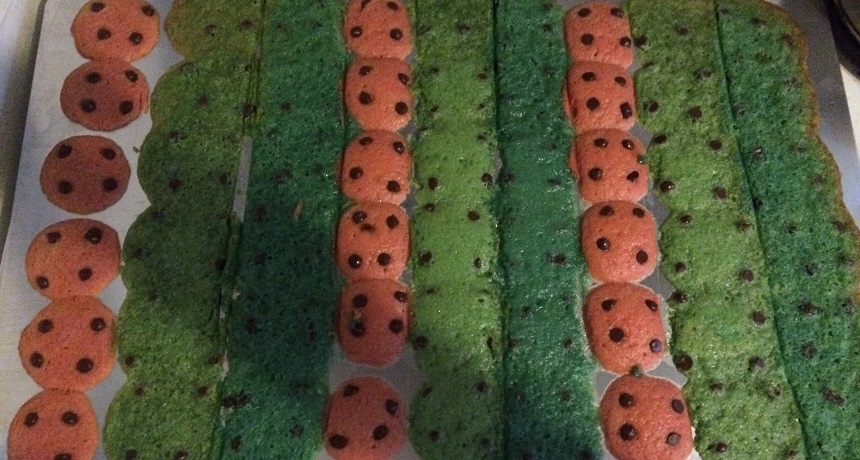Welcome to Cookie Science!
Eureka! Lab shows how to do science through a new, delicious scientific experiment

This is what cookie science looks like.
B. Brookshire/SSP
This article is one of a series of Experiments meant to teach students about how science is done, from generating a hypothesis to designing an experiment to analyzing the results with statistics. You can repeat the steps here and compare your results — or use this as inspiration to design your own experiment.
Many students may want to experiment with science. Unfortunately, some books can make it seem like you need a lab — or at least fancy equipment — to do real science. In fact, opportunities to form and test a scientific hypothesis are all around. A great starting place: your kitchen.
Over the next few months, I will be using weekly posts and photos to teach you how to conduct a scientific experiment right from your kitchen.
Join me as I perform my own delicious tests — using cookies. The inspiration is my friend Natalie. I have a wonderful cookie recipe that my friends love. But Natalie has never tasted it. She has celiac disease, which means that she gets sick when she eats gluten. Gluten is a protein found in wheat — and the wheat flour — used to make cookies. I want to make a gluten-free cookie that Natalie can eat that will taste as good as my usual cookies. But what recipe changes will I need to make?
It’s a great example of how to do science. And in the coming weeks I will document every step of the process, from the original question to the last cookie crumbs. You can read along, and if you want, bake along as well. Try to replicate my experiment, and see if you get the same results.
Along the way, I’ll explain how to form a testable hypothesis. Then we’ll determine what variables to test. In addition, I’ll explain much more, including how to use the “scientific literature,” perform basic statistical tests, keep a lab notebook to track each step and all of my data. Welcome to Cookie Science!
In addition to reading about the yummy — and sometimes not-so-yummy results — you’ll learn the process of setting up experiments to answer some question. Any question. Are you interested in what sometimes makes soda pop explode, how wheels help to counter friction, how long the vitamin C will last in your orange juice or what makes the best insulation for your house? Each of these questions can be answered with the same approach, the same scientific method. But I wanted to work with something a little more delicious, and so I’ve chosen to use cookies.
Scientific ideas are everywhere. All you have to do is ask the right question, and find a safe, workable way to answer it.
Cookie Science Posts
Cookie Science 2: Baking a testable hypothesis
Cookie Science 3: The lab notebook
Cookie Science 4: Cookie ethics
Cookie Science 5: ‘Blinding’ your subjects
Cookie Science 6: Baking it up
Cookie Science 7: How many to bake?
Statistics: Make conclusions cautiously
Cookie Science 8: The meaning of the mean
Cookie Science 9: How data can spread
Cookie Science 10: Finding the cookie difference
Cookie Science 11: That’s the way the cookie crumbles
Cookie Science 12: Heading to the library
Cookie Science 13: The deal with gluten
Cookie Science 14: One experiment, 400 cookies
Follow Eureka! Lab on Twitter
Power Words
celiac disease (or coeliac disease in the United Kingdom) A disorder in which the immune system attacks the small intestine after it encounters foods containing gluten, a wheat protein compound. People with this disease suffer from stomach pain, constipation, diarrhea and a constant feeling of fatigue. They must avoid gluten-containing products like bread, cake and cookies.
gluten A pair of proteins — gliadin and glutenin — joined together and found in wheat, rye, spelt and barley. The bound proteins give bread, cake and cookie doughs their elasticity and chewiness. Some people may not be able to comfortably tolerate gluten, however, because of a gluten allergy or celiac disease.
hypothesis A proposed explanation for a phenomenon. In science, a hypothesis is an idea that hasn’t yet been rigorously tested. Once a hypothesis has been extensively tested and is generally accepted to be the accurate explanation for an observation, it becomes a scientific theory.
statistics The practice or science of collecting and analyzing numerical data in large quantities and interpreting their meaning. Much of this work involves reducing errors that might be attributable to random variation. A professional who works in this field is called a statistician.
variable (in experiments) A factor that can be changed, especially one allowed to change in a scientific experiment. For instance, when measuring how much insecticide it might take to kill a fly, researchers might change the dose or the age at which the insect is exposed. Both the dose and age would be variables in this experiment.